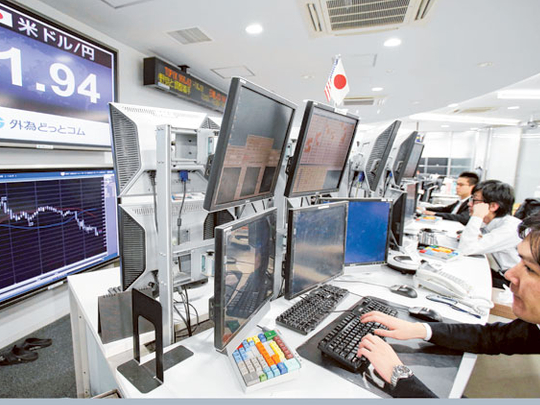
Hong Kong: Asian stock markets mostly rose Wednesday after the Federal Reserve chief played down risks from the US central bank’s low interest rate policies, offsetting worries that Italy’s indecisive election result will rekindle Europe’s debt crisis.
Hong Kong’s Hang Seng advanced 0.4 per cent to 22,605.62 and South Korea’s Kospi added 0.4 per cent to 2,007.94. Australia’s S&P/ASX 200 gained 0.6 percent to 5,033.80. Shares in mainland China, Taiwan and Indonesia also rose. Japanese stocks were the only losers in Asia as the yen strengthened against the US dollar following several months of weakness that boosted exporters. Japan’s Nikkei 225 fell 0.5 per cent to 11,345.54.
In testimony to Congress on Tuesday, Federal Reserve Chairman Ben Bernanke expressed confidence that the central bank’s low-rate policies currently pose little risk of causing runaway inflation or a stock market bubble. That eased recent jitters the Fed would start to withdraw its super easy monetary policy. US economic indicators also gave Asian markets a lift. Home sales rose to the highest level in more than four years last month and American consumers showed confidence for the first time in three months in February.
“Asian markets held up well after US stock markets showed little impact to Italy’s election results,” said Kwak Joong-bo, a Seoul-based analyst at Samsung Securities.
Samsung Electronics Co., the world’s largest maker of memory chips, televisions and mobile phones, rose 0.7 per cent while Hyundai Motor Co. climbed 0.9 per cent. Taiwan-based phone maker HTC Corp. also added 1.3 per cent. Yet stock market gains in Asia remained modest, showing that investors have not fully regained their appetite for risky assets ahead of looming automatic spending cuts due to start Friday in the US.
And with Italy emerging from elections on Tuesday with no clear winner, there are lingering uncertainties about the fate of deficit and debt reduction measures in one of Europe’s biggest economies. The Italian election result drove markets in Europe markedly lower. If Italian parties fail to form a governing coalition, new elections would be required, causing more uncertainty and a leadership vacuum.












